Friday, August 22, 2008
Freshmen and Ipods=learning?
When it gets a little boring, I might pull it out,” acknowledged Naomi J. Pugh, a first-year student at Freed-Hardeman University in Henderson, Tenn., referring to her new iPod Touch, which can connect to the Internet over a campus wireless network. She speculated that professors might try harder to make classes interesting if they were competing with the devices.
And I might toss your Ipod out the window. Check out the comments on the article online--pretty interesting range of responses.
Thursday, August 21, 2008
Ali Lapp (Weise) '96 moves on in DC
Alixandria Lapp joined Parven Pomper Strategies as Vice President in January of 2008. Lapp brings a unique blend of top-level political experience, having been at the epicenter of the Democratic takeover of the House in 2006, and legislative experience, having spent nearly a decade on Capitol Hill as a top advisor to moderate House Democrats.
Prior to joining PPS, Alixandria Lapp served as Executive Director of NDN, a progressive think tank and advocacy organization. During her tenure, she worked extensively on the organization’s Globalization Initiative, immigration reform, and next-generation media and technology tools.
Read more here.
Tags:
Wednesday, August 20, 2008
Erik Connell '07 Peace Corps Swaziland recap
Sanibonani bekunene,
That means hello everyone in SiSwati, the local language in Swaziland. Technically it means hello people of the right hand, but hey, that's how they greet there.
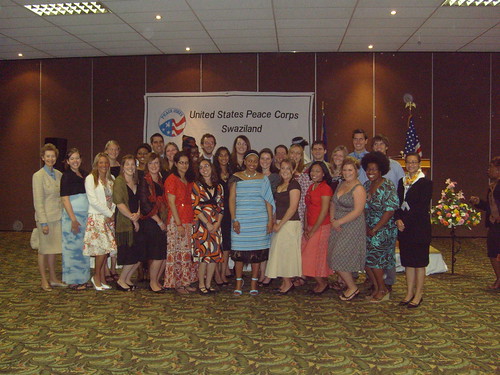
I'm back home now, after spending 13 months there. I resigned due to health concerns combined with the fact that I was not doing as much as I had hoped in the program. It was a tough decision, but I think it was for the best.
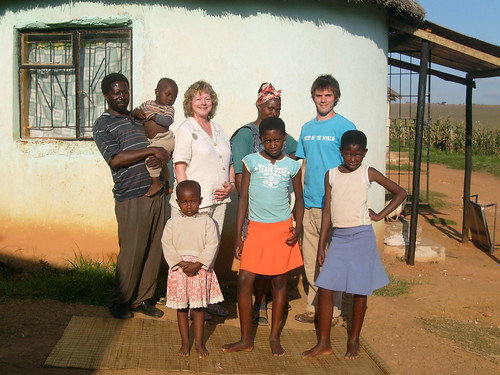
Swaziland was an interesting country to live in; far different than anywhere I've ever been before. It certainly has its share of trouble, with the world's highest HIV/AIDS and TB rates, as well as the fact that 69% of Swazis live on less than US$1 per day (coincidently, around 70% of the country is rural). There was a lot of good there, too, though. Swazis are generally genuinely good people. They're very helpful, and giving, even when they have very little. The main staple of their diet is corn porridge, which they call maize. Some families eat it for every meal. The majority of rural Swazis grow corn.
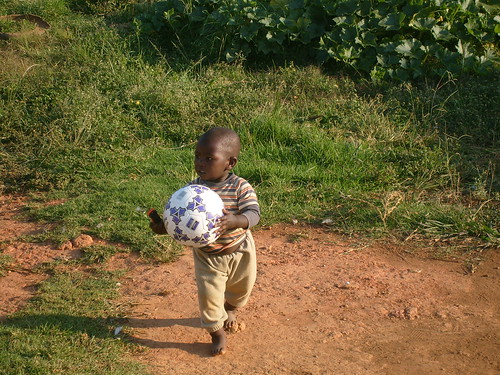
Since this is the long version, I'll start at the beginning. Training lasted 9 weeks, and mainly focused on language and culture, with some medical, safety, and programming (how to do our jobs, HIV/AIDS community health worker). We stayed with host families during training, close to a town in the south of the country called Nhlangano. I stayed with a Dlamini family, which is the surname of the royal family. It is by far the most common last name in the country, comprising over 10% of the country, I've heard. This is because kings generally have many, many children. The previous king, Sobuza II had 210 children from 70 wives. The current king, Mswati III, has a "paltry" 22 children from 12 wives, although he's only 40, so he's still got a few years to catch up. My host family gave me the Swazi name Sibusiso, which means "blessing." Each volunteer got a Swazi name, as not all Swazis were able to pronounce our English names. Mine was especially difficult due to the fact that there are no r's in SiSwati.
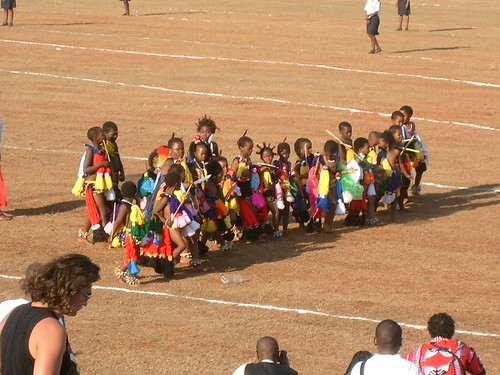
My group was the 5th Peace Corps group to come to Swaziland under the new HIV/AIDS program. There was an education program there a couple decades ago. Originally there were 25 volunteers in my group, 20 girls and 5 guys (sucks for the girls, huh?). We all made it to swear-in in August (a first for this particular program), but 5 of the girls (and I) have since left, for various reasons. Three did not feel safe at site (one was constantly harassed by drunk men at site, another heard a rumor that people in her community had tried to poison the previous volunteer at her site, and the other had a neighbor who was hacked up, a grandmother, with the police report concluding that it was caused by spirits). One had family issues back home and wanted to be there. The other one developed back problems and was unable to move very well, so she was medically separated.
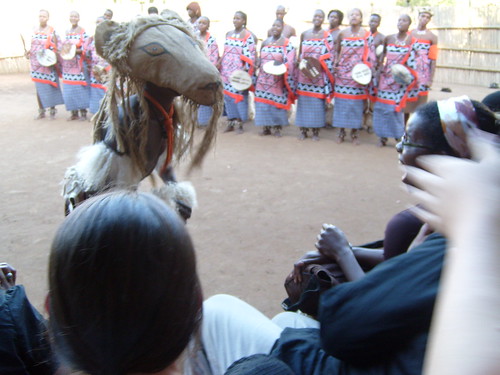
Probably the most interesting story from training was the time my group went to visit a traditional healer, or sangoma. There are two types of traditional healers in Swaziland: inyangas and sangomas. Inyangas are more healers; they use herbs and other natural remedies to help sick people. Sangomas are more like what people would think of when they think of witch doctors: they provide services such as fortune telling, finding lost items, freeing people from curses, and the like. The first thing my group did when we got to the sangoma's homestead was to hide things for her to find. Probably a little under half of our group hid something for her to find, the most common item being candy. When she came out, her assistants proceeded to play drums and shake makeshift rattles, and she went into a trance. While in a trance, she spoke in a much deeper voice, and kneeled down and bounced a lot. She was also quite confrontational and angry. It was a little intimidating. At one point in her act she took off her shirt, which was pretty rough on us Americans, considering she was a rather large and old woman (breasts are not considered a sexual body part in Swaziland). Eventually she started telling us who had hidden things, but it was obvious she was guessing. She got about half of her guesses right. When it was over she stormed off to her hut, and one of her assistants informed us that she felt insulted by our group. She said that candy was for children, and that we should have hid meat (how exactly we were supposed to know that was unclear). She also said that we didn't take her seriously, which was true, but I would say that we hid it well, and did our best to be respectful. She refused to read our fortunes, which she had previously agreed to.
Eventually, after much convincing by Swazi Peace Corps staff, she agreed to read one of our fortunes, provided that we did it topless, to prove that we were taking it seriously. Another volunteer, Brett, and I offered to do it, as we were guys, but one of the girls in our group, Meredith, insisted on doing it. Luckily, they let her put on a lihiya, a traditional Swazi piece of cloth (which is very versatile, by the way, it can be a top, a bottom, both, a head wrap, and many other things). The sangoma came out, still in a trance, and went through a whole act in her deep, menacing voice, then started in on Meredith. She had a mini-feather duster in one hand and a butter knife in the other, and proceeded to dust and poke at Meredith, periodically sticking her head in Mer's chest and crotch. This went on for a while, until finally she revealed her amazing fortune: that sometimes Meredith gets headaches, sometimes she gets stomachaches, and sometimes she gets gassy. Pretty lame. Then she came out of her trance, and we had a Q&A session through a translator. During this session, she was asked if she can cure AIDS, to which she replied that she can, but everyone who has come to her with the disease has come to her too late to be cured. She also made the claim that AIDS is caused by contraceptives. Afterwards, during the debrief, I suggested to the Peace Corps that no American taxpayer money ever go to this woman again.
After training was finished, we were all sworn as official Peace Corps Volunteers at the Royal Swazi Sun Hotel, the nicest hotel in the country. One of the king's wives, as well as several heads of NGOs, were in attendance. The food was spectacular, and the place was lovely.
When it was time for us to go to our permanent sites, they tried to put me at a place called Lushikishini, but I did not feel safe there. The previous volunteer had been robbed by the host family, transportation was not always available, and there were rumors that one of the men on the homestead had held up a khombi (a 15-seater van used for public transportation, quite common in Swaziland). So the Peace Corps moved me to a place called Nsangwini (which translates to marijuana, by the way), which is southeast of Mankayane, if you want to try and locate it on a map. It was the most rural area occupied by a volunteer in Swaziland, 3+ hours by bus away from a bigger town, depending on how crowded the bus was, how many times the bus broke down on the way, and the weather. It was also the only site without cell phone reception at the homestead. I had to walk up a hill for 10-15 minutes to get reception. Finally, it was one of few homesteads without electricity. I did luck out with my host family, though. They were incredibly nice and welcoming people. Not everyone liked, or even really talked to, their host family, but I got along great with mine. The dad on the homestead was Sipho Maseko (k's are pronounced as g's in SiSwati), who was a veterinary assistant. That meant that he was in charge of dip tanks for cattle in the area. He essentially made cows walk the plank into large tanks filled with chemicals. Swaziland was paranoid about cow disease, as a large chunk of their country was quarantined several years back due to foot and mouth disease. That part was taken by South Africa, and never returned. Swaziland is fighting to get it back in international court, but there is little chance of this happening.
Back to my host family. The mom on the homestead was named Gcebile (c's are clicks in SiSwati). She took care of the kids, but she wants to become a government driver (such as an ambulance driver) after all of the kids start school. The children were Qondile, 13 (q's are also clicks in SiSwati), Noxolo (x's are also clicks in SiSwati), 11, Teyise, 5, and Sihlanguseyise, 1. The last was the only boy. The first two attended primary (elementary) school, and the latter two were not in school yet, although Teyise will start next year. The mom and dad on the homestay both spoke good English, so I was able to get to know both of them pretty well. They were definitely an interesting mix of modern and traditional, as were most Swazis. When I would have a friend spend the night who was a girl, they would have no problem with the fact that a guy and a girl were sleeping in the same room, but after the friend would leave, Sipho would always ask me if I was going to marry her.
I lived in what is known as a rondevaal (round house), with a thatch (grass) roof. Many other volunteers had corrugated iron (tin) roofs, which kept the house hot in the summer and cold in the winter, so I was actually happy to have a grass roof. A lot of people have asked what I ate there. I had a gas stove, so I pretty much ate whatever I could cook on that. They had grocery stores in town, so I would just buy food there and take it back home. At first my room was pretty empty, with just a bed and a table left over from the previous volunteer, but I added a lot to it. I bought a kitchen unit and a wardrobe in town. I had a local carpenter make me two bookshelves (one for cooking instruments), some drawers, and a coffee table (the coffee table took about 6 months, though, which was ridiculous). I also bought a couch in town, which I got home by putting it on top of my bus. I saved a lot on delivery that way.
During the first three months as official volunteers, we were in a period known as "lockdown," where we weren't allowed to spend the night away from our respective sites, and we were not supposed to start any real work. Instead, we were to integrate into our communities and use a few of the "tools" they gave us to do so. One of these was called the homestead census, where we went to different homesteads in our community and asked them a series of questions about how their lives were, and what they thought were some problems in the community. Another was a survey a fellow volunteer and I did at our local high school (called Ekuphakameni Central High School) of students' knowledge of, and attitudes towards, HIV/AIDS. There was also a daily clock for students, so we could find out what a typical day was like for them. I also did one activity where I found out about all of the different projects going on in my community. Finally, I did one where I listed all of the different people and organizations that were active in my community.
After lockdown, I was finally free to start doing projects. One thing I did on a fairly consistent basis was I had a boys club at the high school. I taught them life skills, such as how to put on a condom, and general info about HIV/AIDS. We also hung out and had fun sometimes. They were really into volleyball. I taught them how to throw an American football, which was really fun, and funny. They all thought it was a rugby ball at first. The project we did that I was most proud of was when they started a petition to take back the local youth center, which was a place kids could hang out after school. The local government was using it to store food aid, so kids could not use it. It took a long time, but eventually the food was removed.
I also taught at the high school a number of times. I taught life skills, which was mainly related to HIV/AIDS. I taught them basic HIV/AIDS info, how to use male and female condoms, and also engaged in dialogue with them about HIV/AIDS. Classes there are all lecture, so they appreciated getting a chance to give their opinions on why HIV/AIDS is so prevalent in Swaziland, and what can be done to stop the pandemic.
A couple months after the end of lockdown, I held my first workshop in my chiefdom. I provided food (funded by PEPFAR, the President's Emergency Plan for AIDS Relief), and gave out a free UNICEF calendar as a gift, so a lot of people came. Officially 68 people signed in, but the real number was probably closer to 100. I had Population Services International (PSI) came to talk about condom use and the importance of testing for HIV/AIDS. They also tested 20 people for HIV. The Ministry of Health came and talked about prevention of mother to child transmission of HIV/AIDS. The Family Life Association discussed male circumcision (which is quite effective in preventing infection). Finally, I had a local drama group do a skit about the importance of family in the fight against AIDS. Overall, the event went really well!
PSI came back a few months later to do another event. Since I didn't provide food, it was far smaller, but still very worthwhile. Their main purpose was to do HIV testing, but they also talked about condom use again, and did demonstrations with both male and female condoms. In addition to this, they talked about a de-worming tablet they had, and sold a few (don't worry, it was very cheap, less than US 50 cents). They also gave away several boxes of condoms, which was a victory in itself in a country notorious for not using condoms. At the end of the day, 17 people tested, so I was happy.
One of the projects I did in my community that I am very proud of was to introduce condoms into my chiefdom. I went to an organization called the Mbabane Public Health Unit and picked up boxes of both male and female condoms for 13 different structures in my chiefdom. I distributed them to 3 shops, 3 neighborhood care points (where orphans and vulnerable children are fed, the community had meetings at these places sometimes), 2 markets, my kagogo center (started by NERCHA, a national organization, to combat AIDS, there's one kagogo center in every chiefdom), the local high school, the inkhundla (like a county office), a spaza phone (like a pay phone, but there's an actual little shack with an attendant), and the youth center. When I returned from picking up the condoms, my homestay mom asked me if she could have some for herself. At that moment I knew the aforementioned workshops had gotten through to people!
For my Christmas holiday, I met up with my friend Jen in Maputo, Mozambique. She had just finished a semester abroad in Tanzania. We visited a few museums, but mostly we just hung out on the beach. Swaziland is landlocked, so I was great to see a beach again.
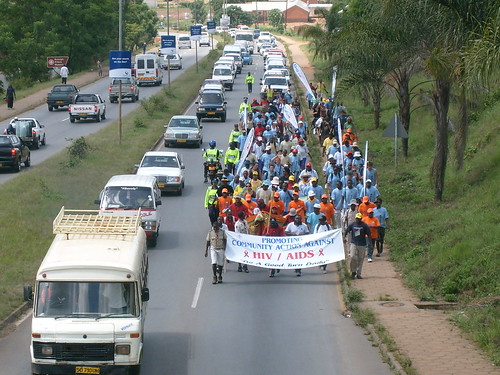
One of the more remarkable experiences of my time in the Peace Corps came this March when I, as well as around 120 other people (about 30 of which were other volunteers), walked across the country. It was about 127 miles and it took us 12 days to do. It was mainly organized by Peace Corps volunteers, with some help from UNICEF and NERCHA. We called it Walk the Nation, and the goal was to raise awareness of HIV/AIDS issues in rural communities. Each day we stopped at a different location to have an event, mostly at schools. At these events we had speakers, free testing, and skits on HIV/AIDS by a Red Cross drama group that was traveling with us. An HIV educator from Dallas-Ft. Worth named Judith Dillard flew all the way out to Swaziland to walk with us. It turns out Dallas-Ft Worth is a sister city to the capital city of Swaziland, Mbabane. Judith has been living with HIV for 18 years. She was a great speaker, and I thought it was great for Swazis to see someone who was open about their status, as so many Swazis are ashamed to admit they are positive due to stigma. Often when someone dies of AIDS there, the family members will lie about the cause of death and just say the person died of a headache or something. The walk was a success. Other NGO's even started holding walks of their own. It was funny because they also called them "Walk the Nation," like our event, but their walks would only last a day. Many Swazis still struggle with the English language.
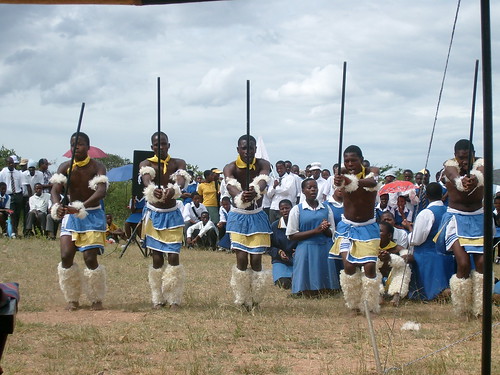
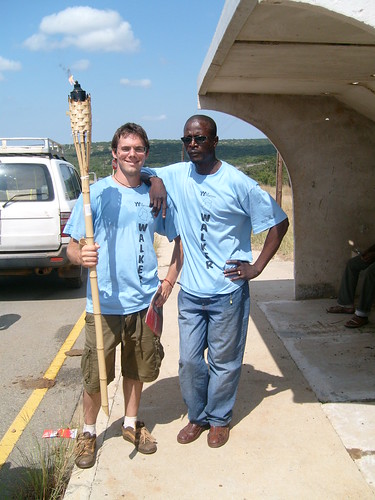
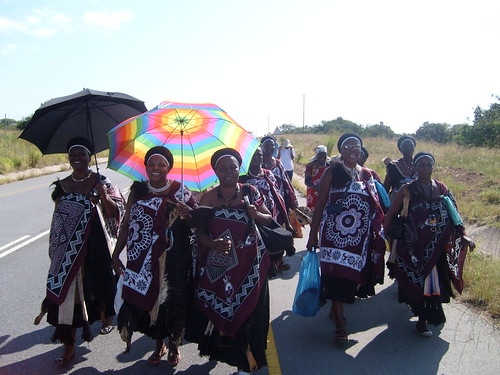
Another project I worked on while I was there was a bee-keeping project that was started by the previous volunteer at my site, Justine. I helped a group of entrepreneurs in my community, who called themselves Buhle Bemaswati, attain the funds to start a small bee-keeping business. They got all of the equipment necessary through a group called Swaziland Charitable Trust. I also helped them further their knowledge of bee-keeping by finding information on it and giving it to them. Honey was named the number one opportunity for small businesses in Swaziland by a business-oriented NGO called Technoserve, which gave a presentation at our training. The industry is struggling in the first world, so more supply is needed. Also, Swaziland is a great place for bees.
In late April, my parents came to visit me. It was great to see them after so long! It was also pretty fantastic to stay in a hotel for 5 days and have warm showers, a car, and good food. The most fun thing we did was to spend a day at a game park called Mkhaya, where we saw elephants, rhinos, zebras, giraffes, hippos, oryx, springbok (called gazelles here), and crocodiles. We also visited the national museum (yes, there was only one in the whole country) and a cultural village, where they wore traditional outfits, danced, sang, talked about the history of the country, and had a model traditional Swazi homestead, where they explained how traditional (i.e. rural) Swazis live. My parents also brought a laptop and helped me get a solar panel to charge it, which greatly improved my quality of life.
One project that I worked on with several volunteers from my area was a career fair, which we put on in the town of Mankayane. We had speakers come from 5 different professions and 2 universities. We also had workshops on how to write a CV (their version of a resume) and how to do a job interview. We threw in a speaker on HIV so that we could get PEPFAR funding for the event. Overall, the event went very well. Hundreds of students attended, and the ones I brought said they got a lot out of it.
Another event I helped out with was a girls' camp that was put on by a fellow volunteer named Shannon, who lived on the other side of the country. She held a 4-day long camp for about 40 girls in her high school to teach them about life skills and to empower them. I used my tae kwon do training to teach a few girls self defense. I also assisted in teaching about time management. The camp was really fun. It was like a kids camp back home, complete with cheers, songs, and dance. The girls were divided into groups, and each group had a name and a cheer. Also, they each came up with a song, dance, or skit that they performed at the end of the camp. Some of the girls I taught tae kwon do to incorporated it into their dance.
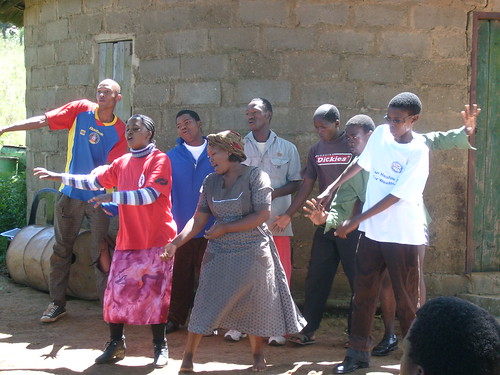
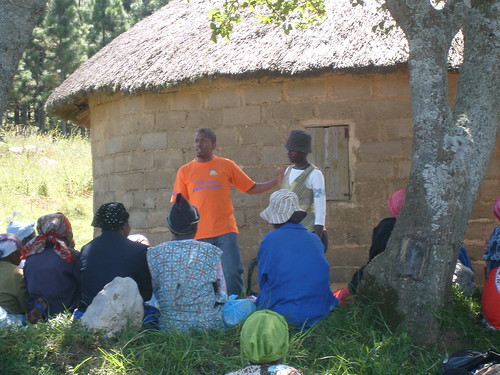
While I did live in a very rural place, I did get the chance to have fun fairly often. Generally, a few volunteers would get together on the weekend, go to a few clubs or bars, and stay at a backpackers (like a hostel). The nightlife wasn't great, but we all needed at least somewhere to unwind, especially with all the death we were constantly surrounded by. There was even the occasional concert in Swaziland. I went to one by a South African band called Freshly Ground, which was fantastic, although a little short. I also went to a world cup qualifier soccer game against Togo which ended up being Swaziland's first world cup qualifier win since 1992! The game was at the national stadium, Somhlolo, which seats 7,000 people, but 15,000 were in attendance. The crowd was nuts! I stormed the field afterward, which was really fun.
At the end of it all, I'm glad I went. I didn't make as much of a difference as I hoped I would. Despite how it may appear above, I wasn't generally that busy. No one project took up much of my time on a consistent basis. I was never given a specific assignment by the Peace Corps office there. The office had some serious issues, but that's another e-mail in itself. For the next group, they are trying something different. They are pairing up volunteers with kagogo secretaries. Kagogo centers are places set up in each chiefdom by a national organization called NERCHA to address HIV/AIDS issues in that chiefdom. Some are more effective than others; the office spoke with NERCHA to determine the most motivated kagogo secretaries in the country, although motivated is a relative term in Swaziland. I hope it works out, because our program was seriously lacking.
Despite this, it was a great experience overall. I learned so much while I was there. I learned what it's really like to live in a poor society, and to live in one devastated by HIV/AIDS. I also learned about international aid, about what is working and what is not. Aid dependence was a big problem in Swaziland, the number of people who asked me for money and candy was ludicrous. That's just scraping the surface. I also made some wonderful friendships that will hopefully last the rest of my days.
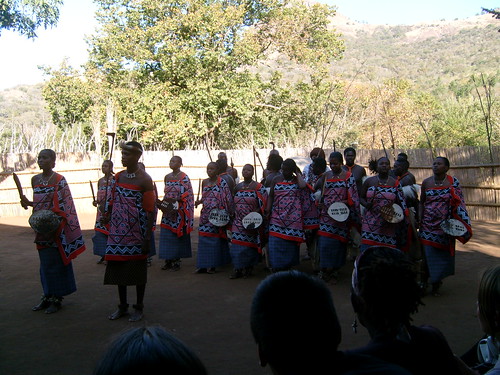
Well, that's probably enough. Thanks for reading it all. If you have any questions for about my experience, feel free to ask.
Salani Kahle (stay well),
Erik
P.S. I've been meaning to write an essay on democratic world government for awhile now, which I will probably do soon. If you're interested in that, let me know and I will send you a copy when I finish.
Tuesday, August 19, 2008
College, Politics and Iran
Among Scholars, Resistance and Resilience in Iran
Tradition of dissent survives despite government pressure
By AISHA LABI
Tehran
Reza Negahdary cuts a surprisingly visible figure at the University of Tehran for someone who has been suspended. Clad in tight jeans and a maroon T-shirt emblazoned with a glittering double-headed eagle, he has stationed himself in the central hallway of the faculty of law and political science. Thrusting a pen at fellow students, he exhorts them to demand that the administration allow for "a free, open, and absolutely democratic election" to the Islamic Association of Students, the reformist group to which he belongs.
Mr. Negahdary, an intense young man who usually has a cigarette in his hand, is barred from classes for three terms and was kicked out of the dorms but has had little problem coming and going on the campus.
In fact, he says he feels safer here than anywhere else. "Outside the university is dangerous," he says. "There are executions if people get politically active. Here, there is suppression, but you don't get executed."
Iran's image in the West has been largely shaped by its defiant, blustering president, Mahmoud Ahmadinejad, and his government's heavy-handed treatment of its citizens. Students have been arrested for their opposition politics, and scores more have been suspended. Internationally renowned scholars, like the Iranian-American Haleh Esfandiari, have been jailed. Provocative publications have been forced to close. And the morality police have upped their harassment of pedestrians on the streets of Tehran for clothing and hairstyles that do not meet the regime's definition of Islamic standards.
But as Mr. Negahdary's very visible presence illustrates, the sometimes cartoonish image of a nation oppressed, isolated, and angry fails to capture the complicated nature of Iranian society and, especially, academe.
Much of the rest of the world is trying to decipher Iran's intentions. Its political and military influence in Lebanon and Iraq, where it has backed Shiite militias, suggests that it wants to become a dominant political force in the region. Its determination to develop its nuclear program, despite international condemnation, has cemented its image in the minds of many as a rogue nation.
Iran's universities provide some insights for those who want to understand its politics. Iranians have an acute sense of national pride and see their higher-education system as the repository of a robust intellectual tradition that predates the arrival of Islam in Persia. Professors are held in high esteem, and many high-ranking government officials, including Mr. Ahmadinejad, are academics by training.
While far from unfettered, many students and professors here remain unyielding and outspoken in their criticism of the regime. And academics continue to maintain ties to the outside world, playing host to a steady stream of international visitors and traveling abroad for conferences and study.
Djavad Salehi-Isfahani, a professor of economics at Virginia Tech, left Iran in 1971 but still visits there regularly. "I am old enough to remember academic life under the Shah, and that was much, much worse," he says. "Professors were so afraid of even talking in front of students. Now is a fairly open atmosphere. The boundary has been pushed, but it is not America yet." Indeed, at times the government seems bent on making high-profile examples of some of the most outspoken activists who push too far.
Deceptive Appearances
At first glance, the tranquil campuses of Iran's universities can seem more conservative than Tehran itself. While many cosmopolitan Iranian women cover their heads with a loosely tied scarf, the black wimple-like head covering called a maghnae is usually required on college campuses and at other public institutions. And at the women's entrance to the Ministry of Science, Research & Technology, several young women are sternly pointed toward a box of tissues and a jar of cold cream to remove excess lipstick and eye shadow.
But, like the sober-hued roopoosh — the required, coatlike garment under which women wear trendy designer jeans, appearances can be deceiving: Campus activism has a long and proud tradition in Iran.
Students have played a pivotal role in social and political upheavals in Iran over the past three decades, from the demonstrations that presaged the Islamic revolution in 1979 to a wave of pro-democracy actions in 1999, sparked by the closure of a leading reformist newspaper, in which at least three students were killed and scores were arrested.
Sporadic demonstrations have roiled campuses in the past year and a half, with students protesting rising food costs and the inflexibility of Mr. Ahmadinejad's hard-line conservative government.
The government clearly views the country's 3.3 million college students as a powerful and potentially problematic political voice. Last year three students from Amirkabir University of Technology, where President Ahmadinejad had been greeted by demonstrators during a visit, were arrested for publishing statements deemed offensive to Islam in a campus newspaper. Their continued detention has sparked demonstrations that have drawn hundreds of supporters.
Mr. Negahdary, the student activist at the University of Tehran, was suspended this year for his leading role in a protest against Mr. Ahmadinejad during a campus visit last October. Students chanted "Death to the dictator" and accused Mr. Ahmadinejad's regime of corruption.
"We protested because at Columbia, Mr. Ahmadinejad said that we are the most free country in the world," says Mr. Negahdary, referring to the president's controversial New York visit last year.
Professors, too, are seen as a threat. Although the president was once a professor of traffic and transport at Tehran's Iran University of Science and Technology, he is viewed with suspicion and thinly veiled disdain by much of the cosmopolitan intellectual establishment.
The hostility is reciprocated. Soon after Mr. Ahmadinejad's surprise election victory in 2005, which he owed to the rural working class, he began speaking of the need to remove secular and liberal influences from universities. Government officials in charge of education policy echo the theme, speaking of shaping the future of Iranian higher education on Islamic precepts.
One of Mr. Ahmadinejad's first actions was to replace the president of the University of Tehran. The new leader, a senior cleric, presided over the forced retirement of some 40 professors, prompting fears of religious and intellectual repression.
Those fears were exacerbated by several high-profile firings. A professor who taught at Shiraz University was forced out after saying at a conference on the Holocaust that it could not be denied as a historical fact.
Yet while a crackdown is under way, it is not a straightforward matter of a conservative government flexing its political muscle over a liberal academic establishment powerless to resist.
The cleric who was appointed to head the University of Tehran was himself removed from office this year after weeks of student demonstrations accusing him of mismanagement.
Much like the partisan bickering between Democrats and Republicans in the United States, Iranian academics say, Iran's government is devolving into a two-wing system of conservatives and reformists. Universities, which are state institutions, reflect that division.
Conservatives are ascendant, as evidenced by some of the recent forced retirements and other personnel appointments.
"They are trying to appoint people at the departmental level to reinforce the type of environment they want and who will reorient the universities in the way they want," says Nasser Hadian, an outspoken reformist and political-science professor who has taught at Tehran for decades.
But the reformists are too numerous — and their legal protections as tenured professors too powerful — to be eliminated.
Mr. Hadian notes that three former departmental colleagues forced to retire, who he says were more the victims of longstanding interdepartmental personality conflicts than political vendettas, stand a good chance of being reinstated.
Other Pressures
The government's pressure on academics and students, although inconsistent, is having an effect.
At the University of Tehran, officials have tried, for example, to quell opposition voices indirectly by hand-selecting representatives for the Islamic Association of Students, the more reform-minded of the two main student organizations with branches on most campuses.
At Sharif University of Technology, an elite Tehran institution renowned for its science programs, members of the association gathered signatures in May for a petition denouncing a conservative group calling itself the Islamic Association of Independent Students.
The name is deceptively close to their own, says Arman Mirhashemi, a fourth-year engineering student who sat at the petition table outside a cafeteria. A purple foam Statue of Liberty-inspired head ornament barely shaded his genial, chubby face from the blazing sun.
At Sharif, he says, more students belong to the Basij Students' Organization, the campus arm of a volunteer paramilitary organization founded in 1979 by Ayatollah Khomeini.
But political activity of any kind is a low priority for most of his peers.
"In this university, students just study," he says.
Mr. Mirhashemi can afford to be more active because he almost has his degree and is now focused on applying to graduate programs overseas.
The day of Mr. Negahdary's appearance at the University of Tehran, he is joined by Roya, a first-year law student who took part in the October protests. Like many of the women on the campus she is heavily made up, ignoring the threat of the fashion police.
Roya, who asks that her last name not be printed, says her hero is Benazir Bhutto, whom she admired for her courage. But she and other female students have also had their courage tested by lurid tales of what happens to women who are arrested.
Roya's eyes, dramatically lined and highlighted by glittery blue shadow, widen as she talks about a female medical student who was reportedly raped in jail.
"Most of the girls arrested are raped in jail," she says. "Families can't cope with that."
Because of such reports, she says, she and other female students have become less outspoken and less likely to take part in future demonstrations.
Sometimes the government's attempts to control student activities can take odd forms. Mahmoud Alaci, a law student, is a member of a campus classical-music ensemble that was scheduled to perform a concert in May featuring works by Mozart, Beethoven, and other Western composers.
Mr. Alaci says the group was given permission weeks earlier and had never guessed the performance was going to be controversial. Western classical music is much loved in Iran. As anyone who has ventured into Tehran's crowded streets can attest, Beethoven's "Für Elise" is an irritatingly ubiquitous cellphone ring tone.
But the conservative regime has deemed such music to be un-Islamic, so university officials began pressing the students to change the program. The officials asked that the event include an anniversary memorial to the emancipation of Khorramshahr, a strategically important port city that was occupied by Saddam Hussein's forces during the Iran-Iraq war.
The students held the concert but ignored the request.
"We didn't mention at all what the officials asked us to say," Mr. Alaci says, noting that the event drew an audience of about 200.
It was a minor triumph, a skirmish in the continuing struggle by students to pursue their own cultural agenda, but one that Mr. Alaci is not inclined to repeat anytime soon. "It's too difficult to get all the permissions," he says wearily.
Conservatives on the Rise
The ascendance of Mr. Ahmadinejad's conservative government has also heightened tensions among students.
Conflict between reformist and conservative student groups has at times escalated into outright violence. Some students who took part in the October protest say that students affiliated with Basij, the volunteer paramilitary group with roots that go back to Ayatollah Khomeini, helped the authorities beat them back.
"They took part in the crackdown," Mr. Negahdary complains. "I was sentenced because of a violation of law and order, but when the Basiji do the same thing in support of the government, they never get this kind of sentence."
Mohammad Jafari, a slight, bearded young law student affiliated with Basij, says the group represents an effort to develop moral values and solidarity independent of Western influences.
"We believe Iranian society has to get ideas and policies from Islamic society," he says. Portraits of the current supreme leader, Ayatollah Ali Khamenei, are ubiquitous in public buildings and loom over even the most unprepossessing offices, but the relatively small one that hangs on the wall of the otherwise sparely adorned student Basij office has special significance. The group defines itself by its special commitment to the supreme leadership, Mr. Jafari says.
The group's more radical tendencies are just one part of its identity, though. One May afternoon, on an outlying campus at the University of Tehran, female members of Basij gathered to meet a special visitor.
It was the anniversary of the liberation of Khorramshahr. The widow of a soldier killed during the siege — considered a martyr in Iran — had come.
Sara Muhamad Kamal, an elementary-school teacher and graduate of the university, organized the session. The group's activities, she says, include arranging conferences and panel discussions related to martyrdom and social outreach to help the poor. She cuts short a conversation as the widow enters the room, her chador and the others swirling in unison as the women rise excitedly to greet their guest.
Attention to Academics
Their political passions notwithstanding, Iranian students, like students anywhere, remain largely consumed with their courses.
That's not surprising, perhaps, given that securing a spot at one of the country's leading universities is the goal of every ambitious young Iranian.
Families that can afford to do so enroll their children in prep courses to boost their chances of landing a berth at an elite institution, and posters for those classes are ubiquitous along the traffic-choked streets of Tehran.
In a classroom a few doors down from the Basiji women's office, the lectern behind which Pooya Alaedini, a professor of social planning, is standing bears a boldly lettered graffiti slogan in English: "The more I make love, the more I want to make REVOLUTION."
The students are oblivious to the incendiary statement, which looks as if it has been there for quite a while. All instead focus intently on the equations Mr. Alaedini is scribbling on the whiteboard.
Mr. Negahdary, the suspended activist, believes that despite the apparent apathy of many Iranian university students, revolutionary fervor lurks just below the surface on most campuses. The conservative regime thinks so too, he says. "The government is afraid of the students, that if they come out of the dorms, it will provoke wider protests in the streets," he says. With students like Mr. Negahdary and academics determined to express their views, Iran's universities will remain the centers of activism and opposition politics they have always been, despite the regime's efforts to silence the most troublesome voices.
http://chronicle.com
Section: International
Volume 54, Issue 47, Page A1
Monday, August 18, 2008
Is College a Waste of Time?
First, we will set up a single goal to represent educational success, which will take four years to achieve no matter what is being taught. We will attach an economic reward to it that seldom has anything to do with what has been learned. We will urge large numbers of people who do not possess adequate ability to try to achieve the goal, wait until they have spent a lot of time and money, and then deny it to them. We will stigmatize everyone who doesn't meet the goal. We will call the goal a "BA."
You would conclude that your colleague was cruel, not to say insane. But that's the system we have in place.
Read it here:http://online.wsj.com/article/SB121858688764535107.html
Thursday, August 14, 2008
Professor Weinberger profiled by Foreign Affairs
http://www.foreignaffairs.org/arp/newsletter/current.html
Wednesday, August 13, 2008
Internship Opportunity: Cascadia
Contact information is available on their website, www.cascadiaproject.org. Contact name would be John Earling or Elizabeth Churchill.
Local campaign seeks workers
David Sawyer
Campaign Manager
Friends of John Ladenburg
www.Ladenburg.org
253.678.2276
Students, be a mentor
New middle-school mentorship program on East Side
As Elliot Stockstad sees it, mentorship programs are one of the best ways to provide positive role models for students. Organizations like Big Brothers Big Sisters do a masterful job, he said, at helping elementary and high school students. But middle school students, he said, often don't have the same opportunity.
A new program, Mentor253, hopes to fill that gap – at least on Tacoma's East Side.
Launched by the Northwest Leadership Foundation last fall with the help of a grant from the U.S. Department of Education, program organizers hope to match 150 students at Gault and McIlvaigh middle schools with mentors by the end next year.
So far, 30 students have been matched with mentors. Twenty others – 10 kids and 10 adults – are going through the required background check and should be paired by the start of the school year.
"After that, eventually, I'd like to see every middle school student matched up with someone," said Stockstad, the program's program director. "I realize that's kind of lofty and maybe unrealistic, but that's what I want to do."
But Stockstad, who spent seven years as a counselor and executive director of Sound Youth Counseling, said he hopes to have 90 matches by the end of next month.
A part-time site coordinator oversees the program at each school and sets up activities, like sports or arts and crafts. All activities take place on school grounds.
Organizers are targeting college students and young professionals to be mentors, but the list includes people from myriad backgrounds, like an English teacher at Mount Tahoma High School and a poker dealer at the Emerald Queen Casino.
Stockstad, the program's only full-time employee, also hopes to establish an honorary mentor program, where prominent members of the community who don't have an hour to spare once a week can still lend their name to the cause.
Julia Garnett, the corporate giving manager at Russell Investments, signed up to be a mentor last spring. Her job responsibilities at the investment firm include researching various charitable programs; when she learned about Mentor253, she signed up.
She and her student, a soon-to-be eighth grader at McIlveigh, only met a few times before summer break, but they played tennis and computer games and made collages.
Garnett was also there to just listen and give advice.
"It's a pivotal place where people can invest their energies to make a change," she said. "I've seen programs where kids are provided with a safe place and someone to talk to, and I've seen it make a difference.
"Evidence points to these programs making changes too, but I've seen it myself."
Friday, August 01, 2008
International Youth Leadership Conference, Prague
17th International Youth Leadership Conference
January 4th – 9th, 2009
Prague, Czech Republic
Join prominent university students from 40 different countries for an experience of a lifetime!
The theme of the conference is “a cross-cultural exchange of ideas concerning the future of world leadership” and the main objective of the IYLC is to blend educational activities and social interaction using a number of inter-related events, such as:
* Simulation of the United Nations Security Council Emergency Meeting
* International Criminal Court Mock Pre-Trial
* Model European Parliament Proceedings
* Visits to foreign embassies, Senate of the Czech Republic, European Commission, Radio Free Europe/Radio Liberty, PricewaterhouseCoopers
* Group debates and panel discussions on international security, environmental sustainability, rule of law, responsible leadership and mass media
* Meetings and banquet dinners with leading experts, diplomats, politicians and businessmen
For more information and application, please visit www.CzechLeadership.com.
Apply early to take advantage of the Early Bird discounts:
20% until August 25th, 10% until September 20th, 5% until October 10th
---------------------------------------------
Yours faithfully,
Ismayil Khayredinov
ismayil@civicconcepts.org
Conference Director
17th International Youth Leadership Conference
Civic Concepts International
www.czechleadership.com
tel: +420 272 730 897
Internship: World Trade Center
Interns are asked to work 15-20 hours per week, and are unpaid. We are flexible to work around student class and work schedules. There are positions available in event coordinating, international trade services, and website design. Interested students are asked to submit their resume, cover letter (indicate which intern position you are interested in and your schedule availability), a letter of recommendation, and also a school transcript if you are interested in receiving academic credit for your internship. For more information about intern positions, visit: http://www.wtcta.org/index.php?CURRENT_PAGE_ID=521.
All application materials and questions about internships can be sent to Darren Brewster at dbrewster@wtcta.org.
Canadian Consulate Internship
Thursday, July 17, 2008
Alex Raposo '08: Field organizer seeks interns
We are in the middle of our campaign season and we are looking for interns, so I thought I'd send this your way. On a more personal note for people reading this, this is a really great internship to have for the summer or the fall--not only is it super fun, but a really great learning experience. You will work on the Adam Smith campaign but also be exposed to other Democratic Party campaigns. I know I benefited a lot from my two internship experiences senior year, so I would definitely recommend this experience to anyone who thinks that they might want to get involved with campaigns or politics. Plus, 2008 is going to be an exciting year to work on a campaign!
Summer and Fall Internships Available with Congressman Adam Smith's campaign
Adam Smith for Congress is seeking out talented, intelligent, and dedicated interns for the summer and fall. Minimum number of hours are 10 per weeks and there is an option for class credit. Duties would include, but not limited to
* Assisting the Political Director and/or the Field Organizer in day-to-day duties
* Recruiting volunteers
* Organizing and working with volunteers to contact voters
* Representing the campaign at political events and meetings
* Assist with fundraising and other events, including events with the candidate
If you are interested, please contact Alex Raposo at alex.w.raposo@gmail.com
Thanks so much!
Alex
--
Alex Raposo
Field Organizer for Congressman Adam Smith
alex.w.raposo@gmail.com
www.ElectAdamSmith.com
Wednesday, July 09, 2008
Laurel Bandy '07 Final Mountbatten update
Time for another (maybe my last) London update! I have started the 10-week countdown and will be back in Colorado in late August....The internship program has been a wonderful experience and in the end I can say I have actually enjoyed learning about the Maritime Transport and Insurance Industry and was extremely lucky in my placement. I attended 2 rounds of International Maritime Organization Committee Meetings, 2 International Safety Panel Meetings (Vienna and Dublin), met with senior UK and US IMO delegates and discussed key safety initiatives (that passed and will be implemented internationally this year!), and am in the process of publishing a paper relating to port safety issues.
Thank you all for your e-mails, cards and encouragement this year. It has made the Atlantic pond seem much less wide.
All My Best,
Laurel
Political Consulting?
Dan Anderson '10 interns and blogs for the GOP
Check out www.movered.org. My entry is the one on Wesley Clark- I'm currently working on one about gas prices, and how the Democrats' solution is to raise the gas tax.
The office is sponsoring a BBQ on the 14th here in Bellevue. This is a great opportunity for P&G students to get involved with this election cycle, and regardless of one's political views would be a chance to meet a few of the candidates. Current confirmed guests are AG Rob McKenna, as well as candidates for state assemblyman Steve Litzow (of the 41st LD) and Todd Gibson (of the 33rd). Also, the 22-year-old mayor or Napavine, Nick Bozarth, will be there as well.
Sorry for the shameless plug, but this could be a great event that PG students might find worthwhile.
Best,
Dan
--
Daniel Anderson; Office Intern
King County Republican Party
845 106th Avenue Ste. 110
Bellevue, WA 98004
(415) 259-9684
(425) 990-0404
Americorps opening, Seattle
AmeriCorps Member Position Opening
Open Until Filled - Apply Now!
Host Site: El Centro de la Raza
Project Name: Hope for Youth Violence Prevention Program
Summary of Member Project: The project involves maintaining and integrating a curriculum addressing gangs and anti-violence into existing El Centro de la Raza Civil Rights history and poetry classes, as well as assisting with activities in which youth of color are involved.
Description of Activities and Responsibilities:
Daily activities and responsibilities include attendance at Civil Rights history and poetry classes in Seattle Public Schools, assisting the Program Coordinator with registration of youth in classes, researching new materials to be incorporated into the curriculum, developing presentations to be used in classes, researching and coordinating guest speakers to attend classes, assisting with the production of poems in a variety of formats (e.g. t-shirts, anthologies, spoken word CD's), researching and coordinating topics for discussion during staff anti-racism leadership seminars, and assisting with end-of-year recognition events for the students. For areas of skills/experience for which the member needs assistance, the Hope for Youth Coordinator will seek appropriate trainings.
Minimum Background Requirements:
* An interest in and commitment to providing service to the community.
* A strong desire and commitment to undo racism, classism, sexism and other forms of oppression that perpetuate violence in our community
* A strong desire and commitment to work to end poverty.
* Must be a U.S. citizen, national or lawful permanent resident. (Documentation required, at AmeriCorps enrollment.)
* Ability to commit to full time, 40 hours/week participation in national service, minimum of 1700 hours total over the 11-month JustServe AmeriCorps term from September 2nd, 2008 to July 31st, 2009.
* Must pass Washington Access to Criminal History (WATCH) background check, to work with youth under 18 or "vulnerable adults", as required under the Revised Code of Washington. (This is often referred to as the "Washington State Patrol" background check.) Applicants living outside Washington State at the time of AmeriCorps application must also pass a background check, for that state.
* Must pass the National Sex Offender Registry background check.
* Minimum age requirement is 21 years old.
* Must have completed Bachelor of Arts or equivalent degree by the beginning of the AmeriCorps service year.
* Additional minimum requirements for this Member position: ability to work a flexible schedule.
Desired Skills and Experience:
* Bilingual in Spanish and English,
* Experience serving as a volunteer,
* Experience working with youth of color,
* Excellent organizational skills,
* Ability to communicate effectively both with program staff and with participating youth,
* Ability to work well independently and as part of a team, and
* Some computer proficiency preferred - position will utilize MS Word, Excel, PowerPoint and Access.
The JustServe AmeriCorps Program, administered by Solid Ground, provides equal employment opportunity to national service Members without regard to race, color, religion, sex, national origin, age, disability, marital status, sexual preference or status as a veteran.
Hours of Service:
* JustServe AmeriCorps Members commit to a minimum of 1700 hours of service, full time (an average of 40 hours/week) from September 2nd, 2008 to July 31st, 2009. This includes team activities and service at the project site.
* For this specific project site, the Member will generally work the following days of the week, and start/end times each day: Monday through Friday, 8:30 am to 5:30 pm and occasionally 7:00 am to 4:00 pm. Occasional evening and weekend hours are required, with flex time provided.
* JustServe Members participate in the 2008-2009 Team Orientation, from Tuesday, September 2nd to Friday, September 5th, 2008. Members also attend ongoing team meetings and trainings (weekly throughout Fall 2008 and biweekly starting January 2009), at least three large group community service projects (Fall 2008, January 2009 MLK Day and April 2009) and two overnight team retreats (one in the fall and one in the spring) throughout the national service year.
Benefits: In exchange for 1700 hours of service full time (an average of 40 hours/week) over the 11-month term of service, full time JustServe AmeriCorps Members receive a living stipend of $1,036/month (pre-tax) and a $4,725 post-secondary educational award (on completion of year of service). Health care (medical) is provided, if needed. Limited childcare benefits are provided, if income eligible. Up to (20) one-way Metro bus tickets/month are provided for transportation to community service activities, if needed. JustServe placements are AmeriCorps*State Member positions.
How to Apply: Positions are open until filled, so apply now! We will begin accepting applications in May 2008 and the entire team must be hired by the end of August 2008. To apply online, go to http://www.americorps.org. (Once you have completed your application, select for your application to be sent to: "JustServe AmeriCorps-Solid Ground".) If you have questions about the application process or to request a paper application, please go to Solid Ground's website at www.solid-ground.org or call Solid Ground National Service Recruitment Coordinator Ian Dapiaoen at (206) 957-4779 ext. #115.
For more information about this specific JustServe project site, please contact:
Estela Ortega
Associate Director
(206) 957-4613
eortega@elcentrodelaraza.org
www.elcentrodelaraza.org
Take a Chance for Peace
Dear Friends, Colleagues and Family,
I write you with a wonderful opportunity to win some FABULOUS prizes while supporting important work for human rights and environmental justice in Guatemala.
NISGUA's 2008 "Take a Chance for Peace" Drawing is underway! Prizes include:
***a trip to the Social Forum of the Americas in Guatemala October 7-12 plus a week of Spanish language school in Xela (note: if you don't want to travel to Guatemala, the travel voucher can be used to fly elsewhere at another time!);
***another travel voucher to fly to Guatemala for the Social Forum, or elsewhere! (That's TWO CHANCES to win free travel!!)
***$300 cash prize
***$100 gift certificates for "Heart of the Sky Fair Trade" goodies
***other prizes, including art, microbrew beer of the month, just coffee...
Tickets are $25 and can be purchased at: http://www.nisgua.org/drawing/entry.asp
Only the first 750 people to enter the drawing will be eligible, so PLEASE ENTER TODAY! Your chances are 1 in 750 of winning one of the great prizes, and your $25 will go directly to supporting NISGUA's important work for justice, human rights, the environment and dignity in the Americas.
Thanks in advance for your support, and good luck in winning a prize!
Best Wishes,
Jennifer and all at NISGUA
P.S. Stay tuned for NISGUA's NEW WEBSITE, which will be up and running in fall 2008!
******************************
Jennifer DeLury Ciplet
Executive Director, NISGUA
The Network in Solidarity with the People of Guatemala
436 14th St., Suite 409, Oakland, CA 94612
tel. (510) 238-8400
fax (510) 238-8444
www.nisgua.org
Tuesday, July 01, 2008
Professor Sousa wins the Caldwell Award!
Chris and David:
It is my pleasure to inform you that your book, American Environmental
Policy, 1990-2006, is recipient of the 2008 Lynton Keith Caldwell Award
for the best book in environmental politics and policy, awarded by the
Science, Technology, and Environmental Policy section of the American
Political Science Association. Your book was selected out of a group of
over thirty works by a committee comprised of Sheldon Kamienecki, Sarah
Pralle, and myself.
Congratulations. It is a well deserved recognition by your peers in the
discipline. As a former winner, I can tell you that the award makes you
grow taller in the eyes of your colleagues, your students start to
actually listen to you, and your domestic partner starts to believe that
you know something. OK, maybe two out of three. But it is nice, if only
because it validates all of those hours spent wondering why you bother. So
enjoy.
News of your award will be posted in the program of the coming APSA annual
meeting in Boston, which I hope at least one of you will attend so that
you can be recognized formally at the STEP section business meeting at
12:15 on Friday, August 29. I will also contact MIT Press with the good
news.
Congratulations again.
All the best,
Christopher J. Bosso
Associate Dean, School of Social Science, Urban Affairs and Public Policy
150 Meserve Hall
Northeastern University | Boston, MA 02115
Tuesday, June 24, 2008
Organic alums
Thursday, June 19, 2008
The long civic generation and the occupation of Japan
I recently joined the Bellevue Sister Cities Association and in addition to becoming an active member of the Yao committee I have become newsletter editor. The demographic make-up of the association reminded me of Bowling Alone and Putnam's discussion of the Long Civic Generation. Currently we are having difficulty recruiting new members and having some difficulty getting more enthusiastic support from City Hall. If any alumni living near the Eastside might be interested in joining and partaking in tax deductible trips to Asia and Europe you would be more than welcomed.
Several BSCA members were either involved in the occupation of Japan or were Japanese-Americans interned during WWII. A couple months ago I was given this 1942 Kenkyusha Japanese-English dictionary from Florence Metcalf, head of the Yao, Japan Committee. She worked in the Allied Translator and Interpreter Section (ATIS) using the dictionary to translate news articles and teach English. The dictionary was printed by Harvard and I was informed that the payment of royalties for these dictionaries was suspended because of the War. So in addition to helping plan for an upcoming delegation visit by Yao and helping sponsor high schoolers for summer exchange trips I have been given a valuable piece of history.
I thought this might be worthy of passing on and perhaps inclusion in the department's blog.
-Bill Bockman'06
Alumi Awards--nominate someone--
Alumni Awards
We are proud that so many Puget Sound graduates go on to contribute to their communities, professions, and our university. The annual Alumni Awards, presented at a ceremony at Homecoming each fall, recognizes these accomplishments. Descriptions of the awards can be found below. To nominate a worthy alum for an award please use the Nomination Form. Please submit nominations no later than July 15, 2008.
Professional Achievement Award
Given to alumni whose professional career and work exemplify the intellectual curiosity, active inquiry, and reasoned independence that a Puget Sound education develops. Recipients have gained national or international recognition in their careers in a manner that reflects positively on the university.
Service to Community Award
This award is presented to alumni whose commitment, skill, and dedication have had a significant impact in their community. Through voluntary service in artistic, recreational, educational, human service or other worthy organizations, recipients of this award better the quality of life around them.
Service to the University Award
This award takes many forms of service into consideration: volunteer involvement with the alumni and parent office, with the annaul fund, in academic or other departments on campus, in the regions where alumni live and work, or in public relations.
Young Logger Award
This award is presented to a current student or recent graduate who has made significant contributions to creating programs that bring alumni and students together, that familiarize students with the alumni association, and that encourage class identification.
Friday, June 13, 2008
Alum Update: Estevan Munoz-Howard '04
I just thought I'd fill you in on some of my recent updates. I got a job as Co-Director of a small nonprofit in South Seattle. The Youth Media Institute is a White Center-based organization that trains high school age youth in media justice issues and media technology. We partner with SCAN TV and KBCS radio, among several other organizations and teaching artists, who provide technical trainers for our out-of-school and summer workshops. I just returned from the National Conference for Media Reform in Minneapolis, which was very interesting and energizing; I met a ton of people and made some great contacts for future work. I mentioned a while ago that I was looking to do some work related to building social capital and I think I've found it.
Oh, also, I just got accepted to the Nonprofit Management Certification program at UW, which I'm really excited about.
I hope you are well. Thanks for keeping up with this blog; it's nice to hear about what other UPSers are up to!
Take care,
Estevan Munoz-Howard, '04
Tuesday, June 10, 2008
Iran overview
I flew Air France to Paris and then on to Tehran, about 20 hours total travel time. Women needed to don headscarfs before leaving the plane, and it took me about two hours to exit the airport, as I was fingerprinted and generally left to cool my heels while paperwork was shuttled about.
I was in Iran for 10 days--Tehran, Yazd, Shiraz, Esfahan, with various other sites along the way. It was just me and my guide. I had access that I did not expect, such as being able to get into Friday Prayers at Tehran University, which is more of a national political rally broadcast each week, complete with the obligatory calls of "Death to America!" I had tea with an ayatollah and we spoke about the separation between faith and state (which he supported). I spoke with those who had fought in the war with Iraq, including my guide, who had trained in the US before the revolution. I visited Khomeini's grave, and saw the graves of the countless young who died in the war. I met many many people, all of whom were friendly and welcoming to me as an American, which I was always clear to identify. Lots of criticism of the current regime, no singing allowed in public, lots of young women pushing the envelope on what is acceptable to wear, but lots of religious conservatism as well. These few words don't capture it all, nor do these few pictures, but it gives you a taste. If you have any questions feel free to drop me an email or leave a comment.
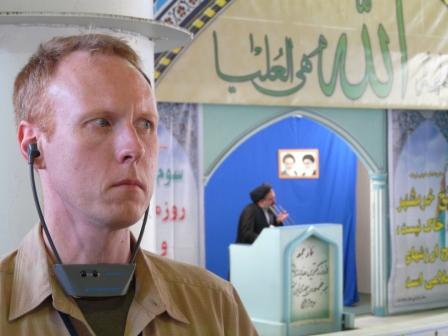
Me at Friday Prayers at Tehran University, up in the press box.
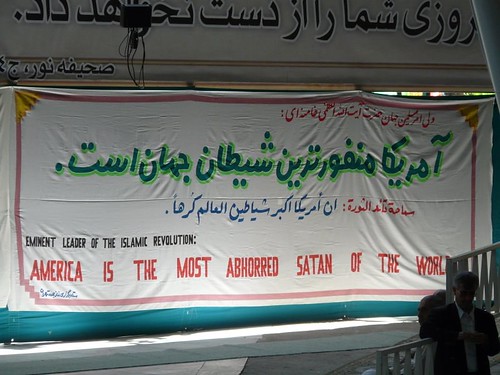
Banner at Friday Prayers.
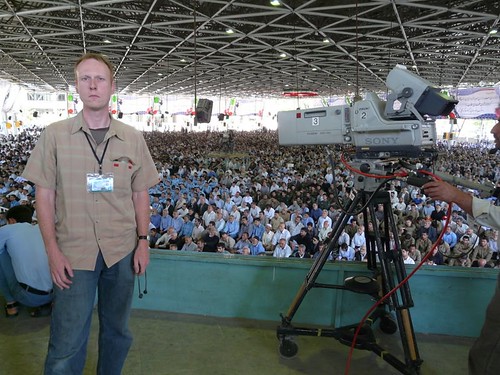
Me again at Friday Prayers.
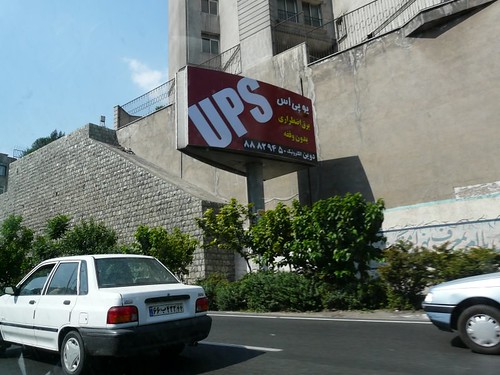
Our branch campus in Tehran.

My hotel in Yazd.
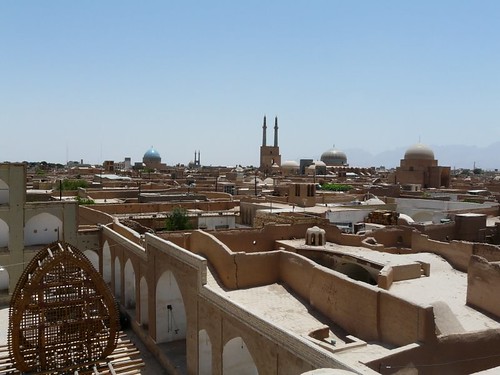
Yazd.
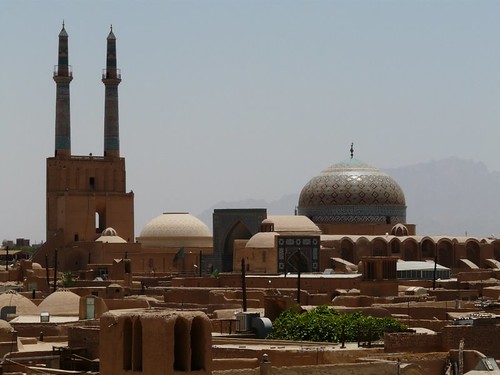
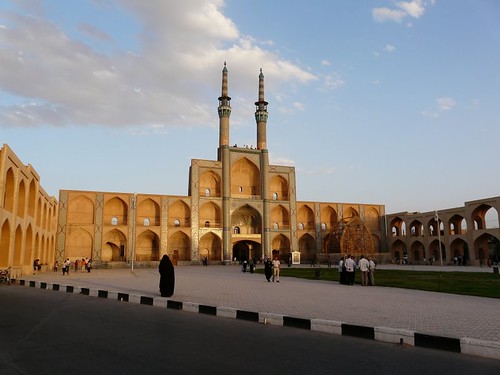
Yazd.
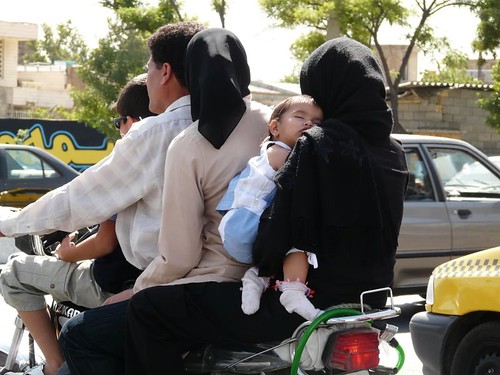
Five on a bike.
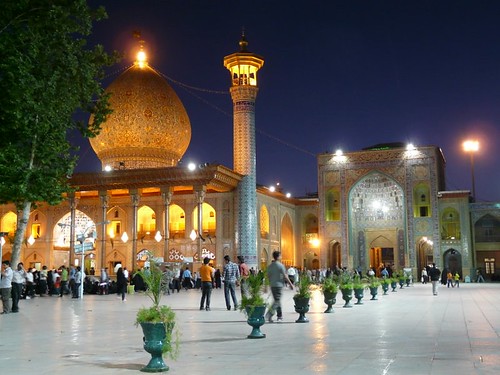
Yazd.
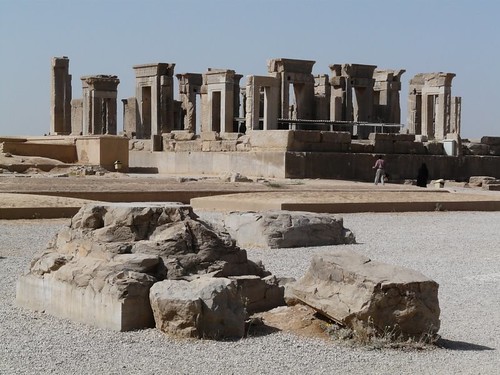
Persepolis (that place Foreign Policy says you can't see).
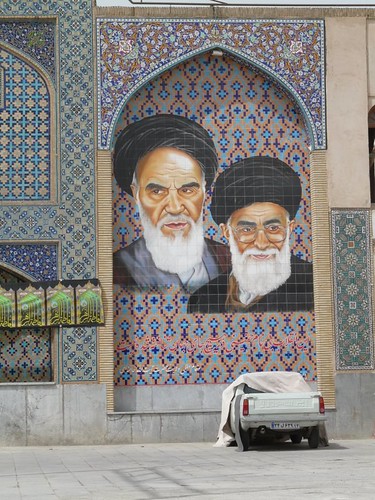
Esfahan.

With the Ayatollah Ansari. Esfahan.
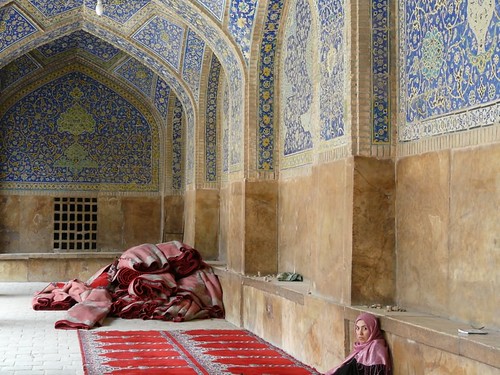
Esfahan.
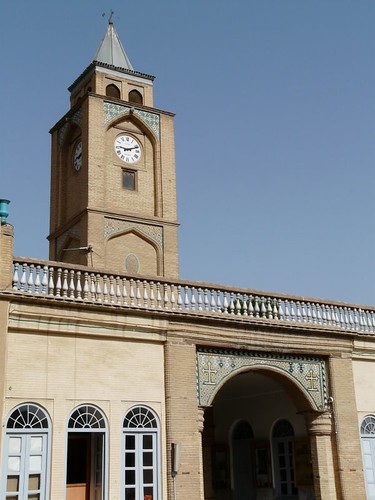
Christian church. Esfahan.
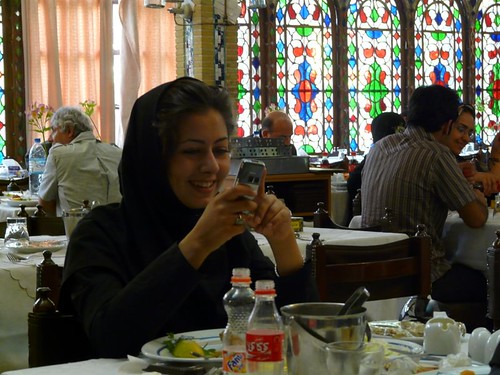
Everyone is cellphone crazy. Esfahan.
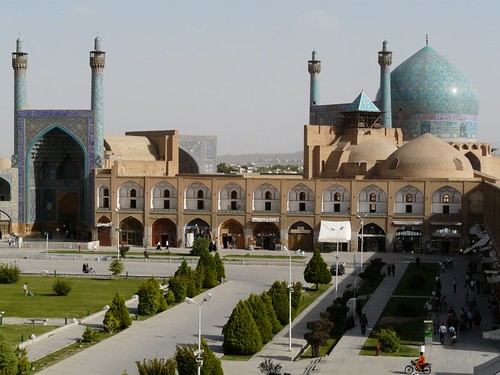
Esfahan.
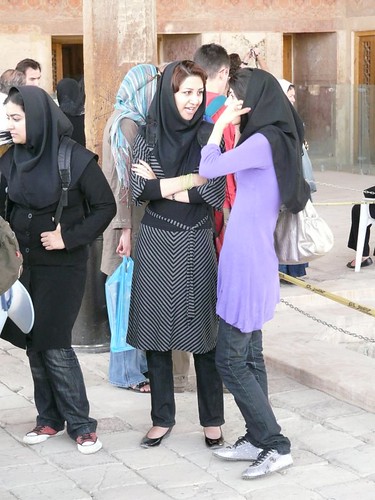
Stylish.
Monday, June 09, 2008
Nice Graduation Picture
Thursday, June 05, 2008
08-09 on/off campus internships with NARAL
Youth Programs at NARAL Pro-Choice Washington.
I wanted to let you know that NARAL Pro-Choice Washington is
currently looking for interns at your school that can help us with
outreach to your campus community. In particular, the intern would
lead a Students for Choice campus group. This is a truly unique
internship for students because all the work of the internship would
occur on campus, as opposed to in NARAL's Seattle office.
I am hoping that you can post or send this internship description to
anyone you know that may be interested in getting involved in the
pro-choice movement.
Sincerely,
Sasha Summer Cousineau
Director Of Volunteer & Youth Programs
NARAL Pro-Choice Washington
811 First Avenue, Suite 456
Seattle, WA 98104
phone (206)624-1990
fax (206)624-4505
www.prochoicewashington.org
STUDENTS FOR CHOICE CAMPUS ORGANIZER
AVAILABLE: 2008-09 School Year
REPORTS TO: Volunteer Coordinator
HOURS: 5-10 hours per week
COMPENSATION: $100/month stipend
MAKE A DIFFERENCE WHILE YOU GO TO SCHOOL
NARAL Pro-Choice Washington is the largest statewide grassroots
organization dedicated solely to protecting reproductive rights. We
work to ensure that Washington's women have access to the full range
of reproductive choices, including healthy childbearing, contraception, and safe, legal, and affordable abortion.
In order to truly work on behalf of all women, NARAL is also
committed to changing the face of reproductive rights activism by
confronting issues of movement diversity, therefore NARAL highly
encourages women of color to apply.
PAID YEAR-LONG INTERNSHIP AVAILABLE FOR THE 2008-09 SCHOOL YEAR
NARAL Pro-Choice Washington is looking for responsible, dedicated,
resolutely pro-choice students to fill the position of Students For
Choice Campus Organizer.
Campus Organizer's are essential in educating their fellow
students about the importance of reproductive rights.
RESPONSIBILITIES INCLUDE:
*Running a Students For Choice Campus Group.
*Participating in at least two community/campus outreach events
per month.
*Planning and implementing 1-2 campus-based events per school
year.
*Participating in and recruiting students for NARAL Pro-Choice
Washington events and campaigns.
*Participating in regular supervisory phone calls with NARAL
staff.
*Finding a replacement at the end of the internship.
*Other duties as they may arise (For example, writing a letter to
the editor or working with NARAL Pro-Choice Washington to help advance
policy goals).
This internship last through the academic year and is done on your
college campus. Strong communication and interpersonal skills are
required. Applicants must be comfortable working independently with
regular (but long distance) supervision.
Internships with NARAL Pro-Choice Washington let you build your
resume while gaining valuable experience. NARAL Pro-Choice Washington
will work with your school to ensure academic credit where available.
NARAL offers a monthly stipend of $100.
Please email resume and cover letter to:
SashaCousineau@prochoicewashington.org
For more information, contact Sasha at (206) 624-1990 or
SashaCousineau@prochoicewashington.org [1]
ADMINISTRATIVE ASSISTANT INTERNSHIP
REPORTS TO: Director of Administration
AVAILABLE: Summer 2008
HOURS: Minimum of 10 hours per week, flexible schedule M-F 9am -
5pm.
COMPENSATION: This position is unpaid. NARAL Pro-Choice Washington
will help secure academic credit if applicable.
SUMMARY
The Administrative Assistant Intern will be responsible for
efficient maintenance of the NARAL Pro-Choice Washington office space,
database management, and other clerical work. This position will give
the intern hands-on experience with the daily business of a small
non-profit organization.
In order to truly work on behalf of all women, NARAL is also
committed to changing the face of reproductive rights activism by
confronting issues of movement diversity, therefore NARAL highly
encourages women of color to apply.
PRIMARY RESPONSIBILITIES
· Track donations, maintain up to date records
· Assist with database maintenance, input of pledges, make
address corrections, and work with administrative team to improve
coding system.
· Organize and maintain the office and the storerooms in an
efficient and functional manner.
· Assist with ordering office supplies
· Answer phones and direct calls appropriately
· Clerical
· Assist Director of Administration as needed
QUALIFICATIONS
*Strong personal commitment to a woman's right to choose
*Strong computer skills
*Native American/Indigenous, Asian/Pacific Islander, Middle
Eastern/Arab American , Latina, Black/African American women strongly
encouraged to apply
TO APPLY
Please email a resume and cover letter to Sasha Cousineau at
SashaCousineau@ProChoiceWashington.Org.
AUCTION INTERN
AVAILABLE: June 2008 to end of October 2008. The ideal candidate
will be available for this entire period of time. However, candidates
that are available for at least June through August will also be
considered.
REPORTS TO: Development Associate
HOURS: Minimum of 10 hours per week, flexible schedule M-F 9am -
5pm.
COMPENSATION: This position is unpaid. NARAL Pro-Choice Washington
will help secure academic credit if applicable.
SUMMARY:
Intern position will directly assist Auction Coordinator &
Development Associate with all Auction related activities from design
of evening's catalog to tracking and organizing items, donors, and
RSVPs.
In order to truly work on behalf of all women, NARAL is also
committed to changing the face of reproductive rights activism by
confronting issues of movement diversity, therefore NARAL highly
encourages women of color to apply.
PRIMARY RESPONSIBILITIES:
· Track donations, maintain up to date records in Auction
Database
· Assist with the procurement of auction items, contact and
follow up with potential donors and help to pick-up items
· Work at setup and event (must be available all day on the
day of the auction) on Saturday, October 25, 2008
· Assist with design of all publicity materials
· Respond to and track people who RSVP for event
· Assist Development staff as necessary with other tasks
QUALIFICATIONS:
*Strong personal commitment to a woman's right to choose
*Excellent phone skills
*Strong computer skills including Word and Excel as well as
PageMaker, Photoshop and Access requested
*Experience with events (auction, theatrical, promotional, etc)
preferred
*Willingness to and comfort calling strangers and being
persistent
*Ability to work in a fast-paced environment and a great sense of
humor
TO APPLY
Please email a resume and cover letter to Sasha Cousineau at
SashaCousineau@ProChoiceWashington.Org.
ELECTION/POLITICAL INTERN
AVAILABLE: Summer 2008
REPORTS TO: Political Field Organizer
HOURS: 20 hours/week. Must be available Monday-Thursday evenings
and most weekends.
COMPENSATION: $500/month Stipend
SUMMARY: NARAL Pro-Choice Washington is committed to protecting, as
a fundamental freedom, every woman's right to make personal decisions
regarding the full range of reproductive choices, including preventing
unintended pregnancy, bearing healthy children, and choosing legal
abortion. In order to truly work on behalf of all women, NARAL is
also committed to changing the face of reproductive rights activism by
confronting issues of movement diversity. Our goal is to be
intentional in opening relationships of mutual exchange, where NARAL
can teach the skills of community organizing and legislative advocacy
while we learn from the voices, experiences and priorities of women of
color.
RESPONSIBILITIES:
The Election/Political Intern will work 20 hours per week and will
assist with all aspects of our November 2008 elections work, as well
as planning and executing all other field activities. Intern will work
under the supervision of the Political Field Organizer and be an
essential part of the field team.
§ Assist with volunteer recruitment for phone banks, bird-dogging,
and other election related activities.
§ Help prepare materials for phone banks, bird-dogging, and other
election related activities.
§ Help publicize election related volunteer activities through
flyers, community calendars in newspapers, ally organizations.
§ Help track candidate speaking events, radio/TV appearances, and
other public appearances.
§ Work with pro-choice candidates on their campaigns by
canvassing, attending rallies, etc.
§ Assist Public Policy & Field Director with other field/election
related duties as needed.
QUALIFICATIONS
· Native American/Indigenous, Asian/Pacific Islander, Middle
Eastern/Arab American , Latina, Black/African American women strongly
encouraged to apply.
· Reliable access to personal transportation on weekends.
*Strong personal commitment to a reproductive justice.
*Outgoing personality and willingness to talk to strangers on the
phone and in person
*Good computer skills (Familiarity with Microsoft Word and Excel)
*Strong internet navigational skills
TO APPLY
Please email a resume and cover letter to Sasha Cousineau,
SashaCousineau@ProChoiceWashington.Org [2].
BODY { font-family:Arial, Helvetica, sans-serif;font-size:12px; }
Links:
------
[1] mailto:SashaCousineau@prochoicewashington.org
[2] mailto:blythechandler@wanaral.org
Victory 2008 job opportunity
Job Opening: Field Organizer, Washington Victory 2008
Victory 2008 is seeking Field Organizers for the 2008 general election campaign.
Field Organizers will identify and turn out voters for the 2008 general election within a specific geographical area where they are assigned to work. Organizers will manage volunteer training and recruitment, voter registration, phonebanks and canvasses, and outreach to local elected officials and Democratic Party organizations.
The ideal candidate for this position has some political experience, a strong work ethic, and is excited about electing Democratic candidates in the 2008 general election. This is an excellent starting position for people interested in a career in politics or government.
Victory 2008 is a campaign run by the Washington State Democrats on behalf of all Democratic general election candidates in 2008. Our goal is to re-elect Gov. Christine Gregoire, deliver Washington to the Democratic presidential nominee, and work on behalf of all statewide, congressional, and legislative Democratic candidates.
To apply, please submit a cover letter and resume to Chelsea Waliser, Field Director, at Chelsea@wa-democrats.org no later than June 1. Candidates will be considered as applications are submitted.
World Refugee Day
Join us on Tuesday, June 17, 6:00 p.m. at Seattle City Hall.
Jen Marlowe, a Seattle-based author and documentary filmmaker of The Darfur Diaries and Rebuilding Hope, talks about her experiences in Darfur, south Sudan and other areas of conflict around the world.
Michael Khambatta, the deputy head of the International Committee of the Red Cross, discusses the humanitarian aspects of protecting the displaced and the role of international humanitarian law.
In addition, take an after-hours tour of “From Solferino to Guantanamo: 145 Years of Red Cross Photography” an international photo exhibit on display through early July. Appetizers and beverages provided. The event is free of charge, but space is limited.
For more information or to RSVP, visit www.seattleredcross.org or call (206) 323-2345 x13607.
Event partners include the Mayor’s Office of Arts & Cultural Affairs, Seattle Public Library, International Committee of the Red Cross and Musée International de la Croix-Rouge et du Croissant-Rouge. Click here to learn about other “Crisis and Courage: Portraits of Humanity in Conflict” events and workshops.
Back in action with a job opportunity
Subject: Presidential Election Campaign - Career Opportunities
Deadline for Applications: June 16, 2008 (New Extended Deadline)
Join Grassroots Campaigns, Inc., working on behalf of the Democratic National Committee and in partnership with MoveOn.org Political Action this election year.
Grassroots Campaigns is running a state-of-the-art voter mobilization effort for the Presidential Election and to expand majorities in the Senate and Congress. Be a part of making history!
We are currently accepting applications from graduating seniors and alumni with leadership experience for paid election campaign positions nationwide beginning ASAP.
We are looking for passionate, dedicated, responsible people who are willing to work hard to achieve positive change. We need goal-oriented, results-driven candidates with leadership ability, good communication skills, and a strong commitment to social change. Candidates need to be strategic, team players, able to work with and motivate a wide range of people, and able to tell a compelling story. Prior political field work is not a requirement; we provide apprenticeship and experience to strong entry-level candidates who are looking for a way to start making a difference through grassroots politics. However, relevant experience is an asset and may qualify applicants for additional leadership responsibility.
Not a Senior? Summer jobs available across the country. Call Sarah at (888) 999-8852 to apply. And check out www.bringchange2008.org to find out more information.
To Apply, E-mail Resume to: Kara Hughes at khughes@grassrootscampaigns
For More Information, visit us at www.grassrootscampaigns.com or call (857) 207-2120.

